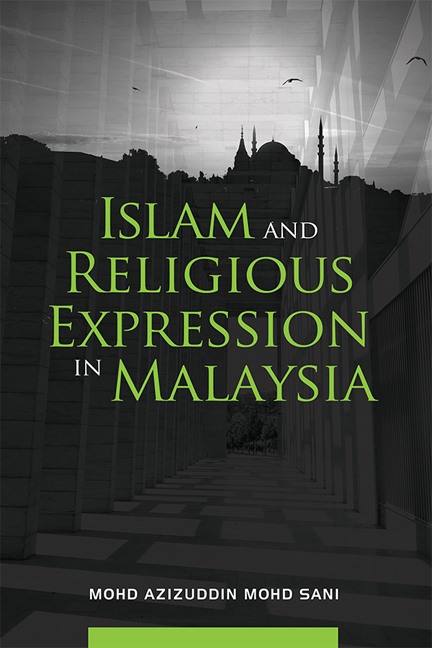Book contents
- Frontmatter
- Cantents
- Foreword
- Preface
- Acknowledgements
- List of Acronyms and Abbreviations
- 1 Freedom of Expression
- 2 Islamization Policy and Islamic Bureaucracy
- 3 Inter-Religious Expression
- 4 Intra-Religious Expression
- 5 Extreme Expression and Radicalization
- 6 New Malaysia under Pakatan Harapan
- 7 Conclusion: Seeking for a Genuine Freedom of Religious Expression
- Bibliography
- Index
- About the Author
5 - Extreme Expression and Radicalization
Published online by Cambridge University Press: 10 November 2020
- Frontmatter
- Cantents
- Foreword
- Preface
- Acknowledgements
- List of Acronyms and Abbreviations
- 1 Freedom of Expression
- 2 Islamization Policy and Islamic Bureaucracy
- 3 Inter-Religious Expression
- 4 Intra-Religious Expression
- 5 Extreme Expression and Radicalization
- 6 New Malaysia under Pakatan Harapan
- 7 Conclusion: Seeking for a Genuine Freedom of Religious Expression
- Bibliography
- Index
- About the Author
Summary
Introduction
This chapter explores the link between extreme religious expression and radicalization, which can lead to acts of terrorism. There is no doubt that religious expression is essential for any religion, including Islam. However, religious expression can also be detrimental if it is manipulated for violent purposes. It can radicalize innocent people into extremists for certain illegitimate and illegal causes. Article 20 (2) of the International Covenant on Civil and Political Rights (ICCPR or “the Covenant”) codifies the duty of the state to prohibit advocacy of religious hatred and to provide assistance in resolving these difficulties (Temperman 2011, p. 109). However, this chapter will explore further than religious hatred expression.
In the UK parliamentary debate on 17 January 2006, the government paid attention to the role of free speech in propagating violent radicalization:
We should not ignore the contributory role that radical texts and extremist pamphlets have in radicalisation. They serve to propagate and reinforce the extremist and damaging philosophies which attempt to justify and explain the motivations of terrorists. We should not underestimate the role that such literature can have in radicalising vulnerable and susceptible young people, particularly changing Muslims from law-abinding members of the community to potential terrorists (Choudhury 2009, p. 465).
Sara Savage and Jose Liht (2009, p. 504) concur with the UK government that speech that explicitly incites racial or religious hatred or glorifies or incites terrorism rights comes under the authority of the government, policing, and legislative bodies. In other words, any attempt to radicalize people for the purpose of luring them into terrorism are illegal and will be dealt with by the authority. As announced in Queen Elizabeth's speech on 18 May 2016, the UK “Counter-Extremism and Safeguarding Bill” is expected to codify the definition of extremism identified in “vocal or active opposition to fundamental British values including democracy, the rule of law, individual liberty, mutual respect and tolerance of different faiths and beliefs, as well as calling for the deaths of members of the armed forces” (Shepherd 2017, p. 63). The Bill also imposes a range of mainly civil measures directed towards eliminating allegedly dangerous extremist speech from public dialogue.
- Type
- Chapter
- Information
- Islam and Religious Expression in Malaysia , pp. 113 - 134Publisher: ISEAS–Yusof Ishak InstitutePrint publication year: 2020

